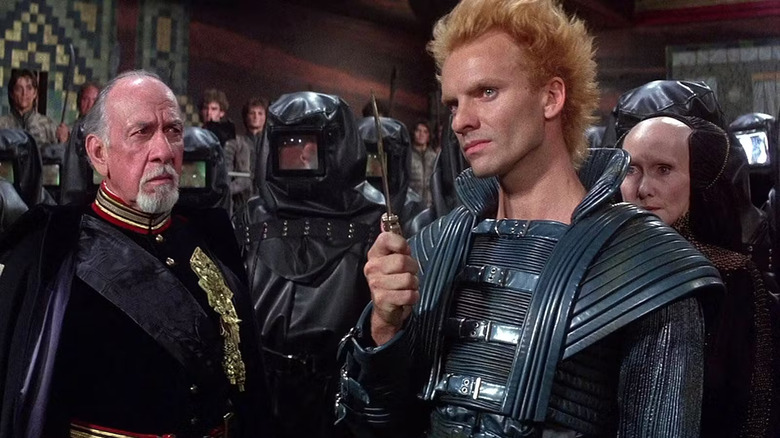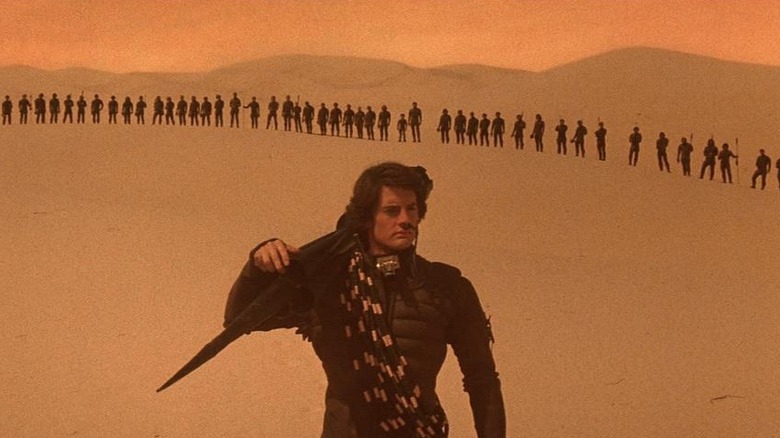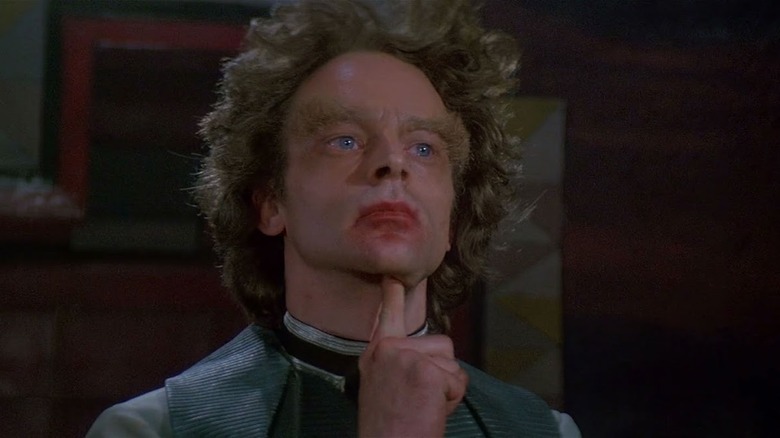Dune's Failure Taught David Lynch A Lesson
David Lynch's 1984 film adaptation of Frank Herbert's "Dune" represented a turning point in the director's career. Prior to 1984, Lynch caused a stir on the Midnight Movie circuit with his debut feature, the nightmarish "Eraserhead." He followed that with the Mel Brooks-produced biopic "The Elephant Man" in 1980, a film that was nominated for eight Academy Awards, including Best Picture and Best Director. It won none. Regardless, Lynch was now poised to be a Hollywood player, despite his penchant for surrealism and unusual creative process.
In the early '80s, Lynch was infamously approached to direct "Return of the Jedi," a project he didn't understand. Lynch's story of meeting George Lucas is legendary, and is widely available to watch on YouTube. Instead of "Jedi," Lynch's opted to make "Dune," a massively ambitious sci-fi film with a $42 million budget. Herbert's book is notoriously psychedelic, and Lynch wanted to retain the novel's bonkers spirit, while also adding elements of his own; in Lynch's adaptation, the young Paul Atreides (Kyle MacLachlan) has the magical ability to turn his voice into destructive concussive blasts.
Lynch, for the first time in his career, had studio bigwigs breathing down his neck. Producer Dino De Laurentiis wanted Lynch's three-hour cut shaved down to two hours, and insisted on an opening narration, as well as a lot more voiceover to explain to audiences what the heck was going on. More and more compromises had to be made, and Lynch became increasingly disillusioned with his film and with the Hollywood process in general.
Lynch now famously said that "Dune" is his least favorite movie experience (he once said he died two times watching it), but that it also taught him an important lesson: never make any more compromises. He reiterated these views in a recent interview with NPR.
Dune > Jedi
It should be said that despite Lynch's hatred of it, his "Dune" has many passionate fans. Some audience like how strange and oblique it is. De Laurentiis may have tried to clear up the film's plot, but "Dune" is still dizzying and difficult to follow ... and some fans like it that way. It's also amazingly textured and appealingly odd, featuring vast sci-fi visuals, weird creatures, and a gross, oily despot that stands as one of the best villains in the history of the genre. "Dune" has a slimy, tactile, emetic quality that a mainstream sci-fi hit like "Jedi" could only dream of.
But it was not Lynch's vision. The studio wanted continuous re-cuts and then kept on chopping it up, even after Lynch had finished. There's a notoriously long TV edit of "Dune" which Lynch hated so much, he had his name removed from it.
Lynch realized after the fact that he should have asked for final cut. Final cut is, in the modern era, rarer than ever. In 1983, it might have been possible, had the director pushed for it. Lynch recalled:
"I knew already one should have final cut before signing on to do a film. But for some reason, I thought everything would be okay, and I didn't put final cut in my contract. And as it turned out, Dune wasn't the film I wanted to make, because I didn't have a final say. So that's a lesson I knew even before, but now there's no way. Why would anyone work for three years on something that wasn't yours? Why? Why do that? Why? I died a death. And it was all my fault for not knowing to put that in the contract."
Lynch has had director's cut on ever one of his films since.
Life after Dune
Lynch's next film after "Dune" was "Blue Velvet," a surreal suburban noir about kink and kidnapping. It cemented Lynch's personal style, and was made under his own control. "Blue Velvet" was critical darling, and its notorious sex and violence caused a stir among cineastes. His "Wild At Heart" won many awards, and his TV series "Twin Peaks" rattled the pop zeitgeist. Fighting for his own vision, Lynch found, was not just creatively edifying, but provided him with commercial success.
Back in 2022, however, while talking about his as-of-now final film "Inland Empire" with the AV Club, Lynch finally noted that he might want to return to "Dune" and produce a director's cut, finally pacing the film the way he wanted. He said:
"[Fans have asked] 'Don't you want to go back and fiddle with "Dune?"' And I was so depressed and sickened by it, you know? I want to say, I loved everybody that I worked with; they were so fantastic. I loved all the actors; I loved the crew; I loved working in Mexico. I loved everything except that I didn't have final cut. [...] But the thing was a horrible sadness and failure to me, and if I could go back in I've thought, well, maybe I would on that one go back in"
But Lynch was quick to clarify that there isn't a classic that can be salvaged from the footage he shot. It would be edifying to have final cut, but he still shot the film under duress; a "pure" version of "Dune" will never exist. "And so it might be interesting. There could be something there," Lynch said, "But I don't think it's a silk purse. I know it's a sow's ear."
Lynch is currently working on an album with Chrystabell.


